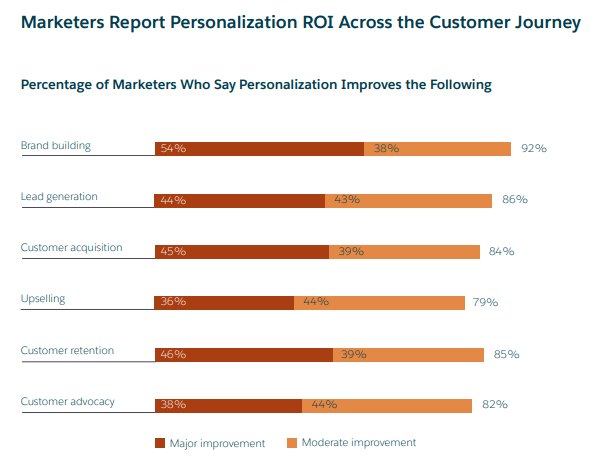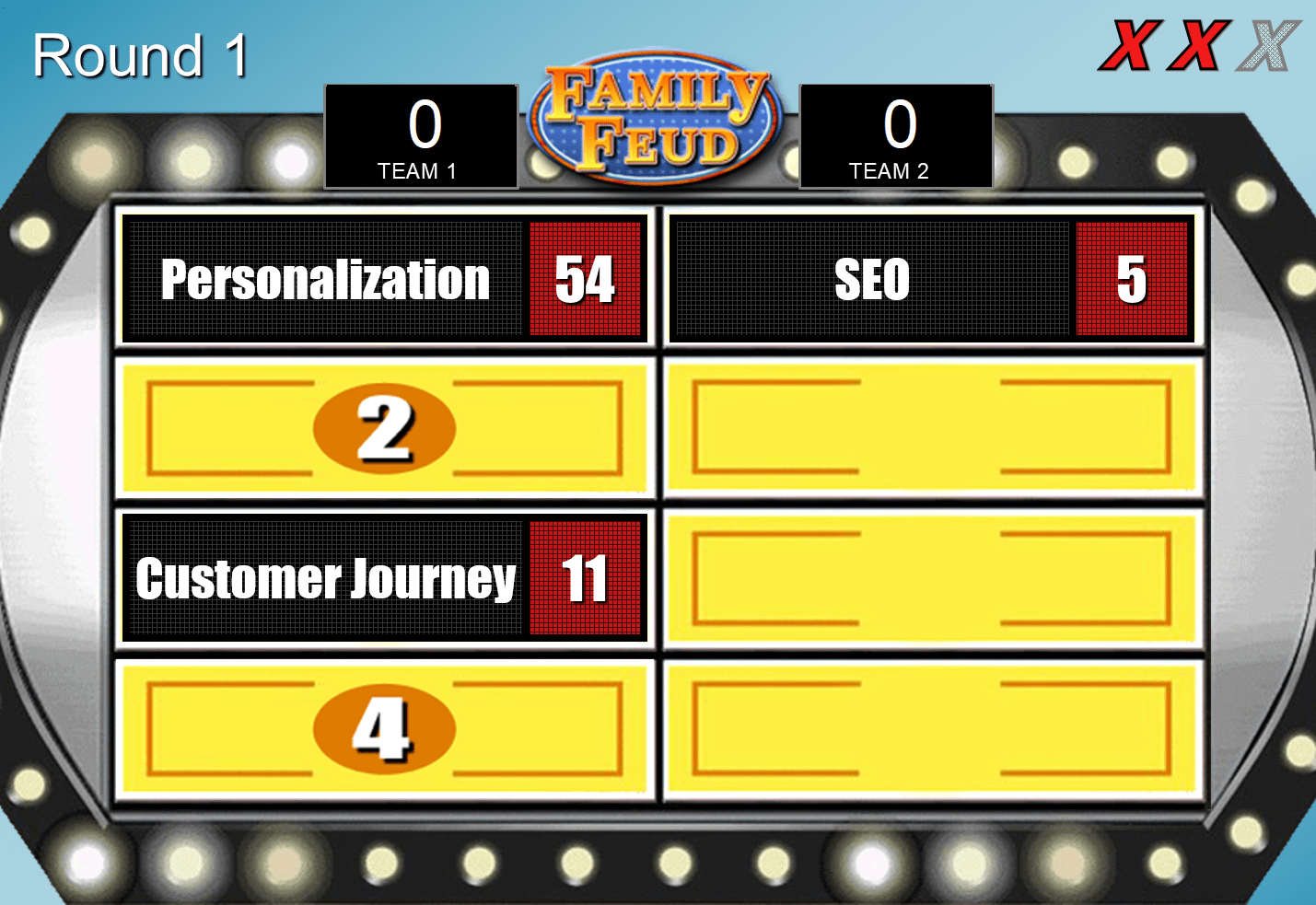Personalization. It’s not just the latest marketing buzz-word. It’s the way to break through the noise and reach your target audience. In fact, it’s a concept that is driving much of the marketing automation technology innovation for both B2B and B2C companies. So, it makes sense that we spend some time figuring out why it is so important and how you can start personalizing your go-to-market. To help us on our journey, I’ll reference key statistics and findings from three well done research studies: the Salesforce State of Marketing Survey, Salesforce’s State of the Connected Customer Research and the B2B Content Marketing 2019: Benchmarks, Budgets, and Trends report from Content Marketing Institute and MarketingProfs.
What is Personalized Marketing?
Before I start throwing statistics at you, let’s get our heads around what personalization in marketing actually means. As with any term, vendors often stretch it to mean things that fit their product capabilities and it can get a little confusing. As a marketer, here is how I define personalized marketing.
Personalized Marketing [pur-suh-nl-ahyzd mahr-ki-ting]
verb. The act of creating marketing content and programs that help marketers reach targeted personas by making them feel as if the communications are directed at them personally.
How marketers execute personalized marketing is where there is a wide range of approaches. Small businesses can execute this with handwritten outreach, but larger companies need help to make this approach scale. Large scale personalized marketing is typically based on using data analytics to identify and refine targets with similar traits and then marketing to those traits. This can be as specific as a campaign aimed at a single company to a broader set of companies within a particular industry who have the same issues; perhaps due to their size, structure, location, etc.
Fundamentally, the idea is to hone in on your targets as much as possible so that you can get very specific (personalized) with your message on how you can help them. Automation tools can help you scale this, but before you get into the how, you need to embrace the #flipmyfunnel concept and change the way you approach your target audience.
Show Me . . . Personalization!
It doesn’t matter which marketing survey you pick up this year, it likely has some aspect of personalization mentioned. The reason why is simple—buyers demand it. The data from Salesforce’s State of the Connected Customer Research report showed that 83% of business buyers (84% of consumers) feel that being treated like a person, not a number, is very important to winning their business. And this isn’t just about their relationship with their salesperson, but about early stage engagement too. Your buyers demand relevant offers that engage them in their moment of need and speak to solving their immediate pain.
of personalization mentioned. The reason why is simple—buyers demand it. The data from Salesforce’s State of the Connected Customer Research report showed that 83% of business buyers (84% of consumers) feel that being treated like a person, not a number, is very important to winning their business. And this isn’t just about their relationship with their salesperson, but about early stage engagement too. Your buyers demand relevant offers that engage them in their moment of need and speak to solving their immediate pain.
Consumer experiences have only added fuel to this way of thinking. Salesforce research showed that 69% of business buyers expect Amazon-like buying experiences — such as personalized recommendations. But the good news is that personalization does drive conversions. Salesforce found that 79% of customers are willing to share data in exchange for contextualized engagement, and 88% will do so for personalized offers. Bottom line, if the buyer can tell you are going to deliver them value, they’ll give you permission to engage.
Content Personalization Requires Altering Your Approach
The first step in personalized marketing is honing in on your target buyer and learning all you can about them. The formal marketing term here would be to build a “persona”. This becomes like a bio of your target buyer so you understand them enough to write every piece of content directed to them. It is no shock that the Content Marketing Institute and Marketing Profs found in their 2019 B2B Content Marketing Survey that 77% of the most successful marketers use personas. If you don’t know who you are writing for, you are likely to miss the mark and fail to grab target buyer attention.

Another interesting chart from Content Marketing Institute and MarketingProfs is about the way successful marketers think about the content they are creating. The top three attributes for successful marketers are all about personalization.
- 90% Prioritize the audience’s informational needs over sales/promotional message. Pushing feature/function doesn’t work unless you can first connect to the buying persona’s pain and show them value to earn the right to engage.
- 81% Prioritize delivering the right content to the right audience at optimal times. Stepping into the shoes of target buyers to understand how they want to be communicated to/with is critical.
- 77% Craft content based on specific points/stages of the buyer’s journey.This ties into satisfying the informational needs of your target audience. The further that marketing can go into the buying cycle to continue to add value, the faster deals will close.

Top Marketers are Doing Personalized Marketing
The Salesforce State of Marketing Survey found lots of indications that high performing marketers are actively embracing personalization approaches. Some of those approaches include Account Based Marketing (ABM) programs and mapping customer journey to create personalized digital interactions. The survey results showed:
- High-performing marketers are 1.5x more likely than underperformers to collaborate with sales teams on ABM programs.
- 45% of B2B respondents execute jointly (marketing and sales) on ABM programs.
- 56% of high-performing marketers are actively mapping the customer journey across the company, compared to 42% of underperformers.
- 52% of marketers adapt marketing strategy and tactics based on customer interactions.
And these efforts towards personalized marketing are paying off! Marketers surveyed by Salesforce reported that personalization improves their lead generation, customer acquisition, and upselling. They even stated that personalization is positively impacting customer advocacy and their brand.

Personalization is a Marker of Success
Rationally, we can all agree that a more personalized, value-add experience will deliver results. Unfortunately, many brands are still wary and have not gone all-in with personalization. There are many tools and tactics to consider, but you can start today just by figuring out who your target buyer is and beginning to create content that is wholly focused on their needs and providing them value.
Still wary? Consider this, in the 2019 B2B Content Marketing Survey, 96% of the top performers agree that they are successful because their organizations have built credibility and trust with their audience.
Take a moment to contemplate that. Are you bringing value to your target buyers? Are you earning their trust with your content? If not, it is likely time to think about tackling personalized marketing.
Feel free to reach out to me if you want to discuss how to make that happen in your organization.


What a talent for excellent telling how to do marketing in a simple way! I love this! Gave a nice inspiration!!! 🙂 Thanks for sharing this!